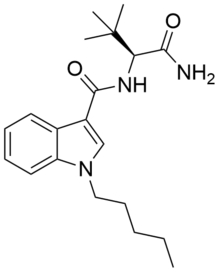ADBICA
 |
|
| Clinical data | |
|---|---|
| ATC code |
|
| Legal status | |
| Legal status |
|
| Identifiers | |
|
|
| CAS Number | |
| PubChem CID | |
| ChemSpider | |
| UNII | |
| Chemical and physical data | |
| Formula | C20H29N3O2 |
| Molar mass | 343.46 g/mol |
| 3D model (Jmol) | |
|
|
|
|
ADBICA (also known as ADB-PICA) is a designer drug identified in synthetic cannabis blends in Japan in 2013.[1] ADBICA had not previously been reported in the scientific literature prior to its sale as a component of synthetic cannabis blends. ADBICA features a carboxamide group at the 3-indole position, like SDB-001 and STS-135. The stereochemistry of the tert-butyl side-chain in the illicitly sold product is unresolved, though in a large series of indazole derivatives structurally similar to ADBICA that are disclosed in Pfizer patent WO 2009/106980, activity resides exclusively in the (S) enantiomers.[2] ADBICA is a potent agonist of the CB1 receptor and CB2 receptor with a EC50 value of 0.69 nM and 1.8 nM respectively.[3]
Legal Status[edit]
As of October 2015 ADBICA is a controlled substance in China.[4]
See also[edit]
References[edit]
- ^ Uchiyama, N.; Matsuda, S.; Kawamura, M.; Kikura-Hanajiri, R.; Goda, Y. (2013). "Two new-type cannabimimetic quinolinyl carboxylates, QUPIC and QUCHIC, two new cannabimimetic carboxamide derivatives, ADB-FUBINACA and ADBICA, and five synthetic cannabinoids detected with a thiophene derivative α-PVT and an opioid receptor agonist AH-7921 identified in illegal products". Forensic Toxicology. 31: 223–240. doi:10.1007/s11419-013-0182-9.
- ^ Buchler IP et al, INDAZOLE DERIVATIVES. WO 2009/106980
- ^ Samuel D Banister; Michael Moir; Jordyn Stuart; Richard C Kevin; Katie E Wood; Mitchell Longworth; Shane M Wilkinson; Corinne Beinat; Alxendra S Buchanan; Michelle Glass; Mark Connor; Iain S McGregor; Michael Kassiou (July 2015). "The pharmacology of indole and indazole synthetic cannabinoid designer drugs AB-FUBINACA, ADB-FUBINACA, AB-PINACA, ADB-PINACA, 5F-AB-PINACA, 5F-ADB-PINACA, ADBICA and 5F-ADBICA". ACS Chemical Neuroscience. 6: 1546–59. doi:10.1021/acschemneuro.5b00112. PMID 26134475.
- ^ "关于印发《非药用类麻醉药品和精神药品列管办法》的通知" (in Chinese). China Food and Drug Administration. 27 September 2015. Retrieved 1 October 2015.
| This cannabinoid related article is a stub. You can help Wikipedia by expanding it. |